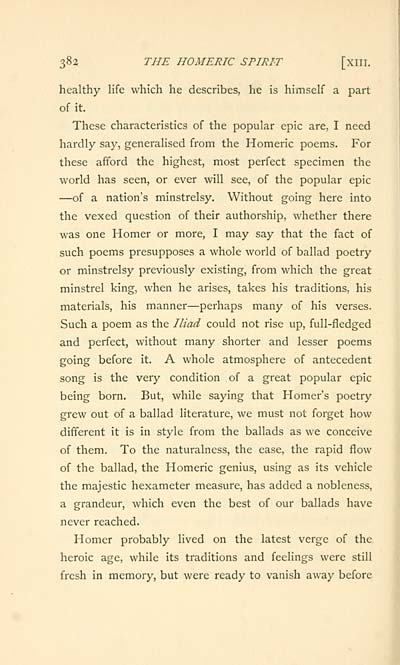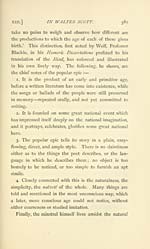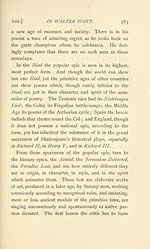Ossian Collection > Aspects of poetry
(398)
Download files
Complete book:
Individual page:
Thumbnail gallery: Grid view | List view

382 THE HOMERIC SPIRIT [xill.
healthy Hfe which he describes, he is himself a part
of it.
These characteristics of the popular epic are, I need
hardly say, generalised from the Homeric poems. For
these afford the highest, most perfect specimen the
world has seen, or ever will see, of the popular epic
— of a nation's minstrelsy. Without going here into
the vexed question of their authorship, whether there
was one Homer or more, I may say that the fact of
such poems presupposes a whole world of ballad poetry
or minstrelsy previously existing, from which the great
minstrel king, when he arises, takes his traditions, his
materials, his manner — perhaps many of his verses.
Such a poem as the Iliad could not rise up, full-fledged
and perfect, without many shorter and lesser poems
going before it. A whole atmosphere of antecedent
song is the very condition of a great popular epic
being born. But, while saying that Homer's poetry
grew out of a ballad literature, we must not forget how
different it is in style from the ballads as we conceive
of them. To the naturalness, the ease, the rapid flow
of the ballad, the Homeric genius, using as its vehicle
the majestic hexameter measure, has added a nobleness,
a grandeur, which even the best of our ballads have
never reached.
Homer probably lived on the latest verge of the
heroic age, while its traditions and feelings were still
fresh in memory, but were ready to vanish away before
healthy Hfe which he describes, he is himself a part
of it.
These characteristics of the popular epic are, I need
hardly say, generalised from the Homeric poems. For
these afford the highest, most perfect specimen the
world has seen, or ever will see, of the popular epic
— of a nation's minstrelsy. Without going here into
the vexed question of their authorship, whether there
was one Homer or more, I may say that the fact of
such poems presupposes a whole world of ballad poetry
or minstrelsy previously existing, from which the great
minstrel king, when he arises, takes his traditions, his
materials, his manner — perhaps many of his verses.
Such a poem as the Iliad could not rise up, full-fledged
and perfect, without many shorter and lesser poems
going before it. A whole atmosphere of antecedent
song is the very condition of a great popular epic
being born. But, while saying that Homer's poetry
grew out of a ballad literature, we must not forget how
different it is in style from the ballads as we conceive
of them. To the naturalness, the ease, the rapid flow
of the ballad, the Homeric genius, using as its vehicle
the majestic hexameter measure, has added a nobleness,
a grandeur, which even the best of our ballads have
never reached.
Homer probably lived on the latest verge of the
heroic age, while its traditions and feelings were still
fresh in memory, but were ready to vanish away before
Set display mode to: Large image | Transcription
Images and transcriptions on this page, including medium image downloads, may be used under the Creative Commons Attribution 4.0 International Licence unless otherwise stated. ![]()
| Early Gaelic Book Collections > Ossian Collection > Aspects of poetry > (398) |
|---|
| Permanent URL | https://digital.nls.uk/78390048 |
|---|
| Description | Selected books from the Ossian Collection of 327 volumes, originally assembled by J. Norman Methven of Perth. Different editions and translations of James MacPherson's epic poem 'Ossian', some with a map of the 'Kingdom of Connor'. Also secondary material relating to Ossianic poetry and the Ossian controversy. |
|---|
| Description | Selected items from five 'Special and Named Printed Collections'. Includes books in Gaelic and other Celtic languages, works about the Gaels, their languages, literature, culture and history. |
|---|

